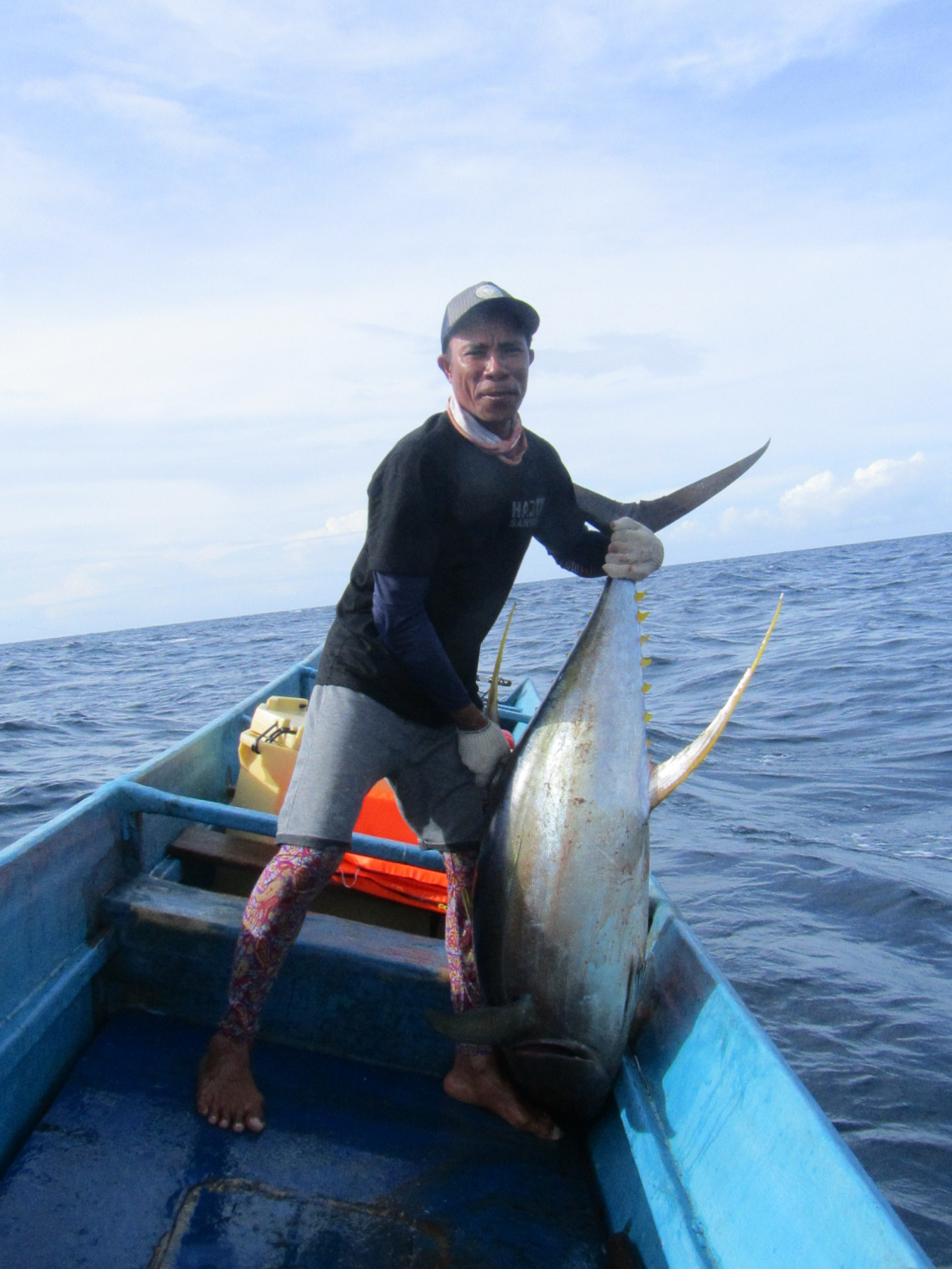Shipment, cold storage issues hamper fishery product distribution
The logistics issues have also affected the country’s ability to export high-quality products.
Change Size
 A fisherman from Waprea village, Buru regency, Maluku, Yusran Tomia, shows off his catch, a large yellowfin tuna. Fishermen from Buru Island have set an example for other small-scale fisheries in Indonesia and around the world that sustainable fishing can improve the livelihoods of fishing communities as the global community celebrates World Oceans Day on June 8. (Courtesy of MDPI/-)
A fisherman from Waprea village, Buru regency, Maluku, Yusran Tomia, shows off his catch, a large yellowfin tuna. Fishermen from Buru Island have set an example for other small-scale fisheries in Indonesia and around the world that sustainable fishing can improve the livelihoods of fishing communities as the global community celebrates World Oceans Day on June 8. (Courtesy of MDPI/-)
I
nsufficient cold storage infrastructure and lengthy shipping routes have posed challenges for fishery product distribution in Indonesia, impeding the industry’s growth, government officials and experts have stated.
Maritime Affairs and Fishery Ministry logistics director Innes Rahmani said on Wednesday that logistics cost inefficiency had remained the top issue for fishery product distribution. This is due to 81 percent of the wild fisheries production centers being located outside of Java, while around half of the processing centers are located within the island, she said.
“One of our main challenges is logistics cost inefficiency, because most of the producing areas are in eastern Indonesia, while most consumers are in the western part,” she said during an online webinar held by the ministry. “Furthermore, lack of infrastructure causes the quality of fishery products to decline quickly.”
The logistics issues have also affected the country’s ability to export high-quality fishery products to its main export market of Singapore, China and Japan, as most of the products must transit in Java before being shipped abroad, reducing the product’s quality during the process.
The government has long made efforts to reduce the stubbornly high logistic costs in the country and reduce price disparities among the country’s many islands. The country’s logistic costs stand at 23.5 percent of the country’s GDP, Finance Minister Sri Mulyani Indrawati said in September.
Read also: Ministry to spend Rp 20b on logistics subsidy to reduce price disparity
The country still posted a 18.2 percent increase year-on-year (yoy) in fresh fish exports in 2019 to US$125.1 million, from $105.8 million in 2018, according to Statistics Indonesia (BPS) data. However, it is still 27 percent lower than 2015’s fisheries exports figure of $171.7 million.
To transport fishery products from the eastern part of Indonesia to Java’s processing facilities, Innes said producers could also utilize the Transportation Ministry’s maritime highway program, which provides subsidized shipping service to Indonesia’s outermost region.
The ministry has allocated Rp 436 billion ($30.7 million) from the state budget to subsidize the maritime highway program this year, up by around 45 percent from last year’s allocation. The budget has so far been used to add seven additional routes for the shipping program, bringing its total routes to 26.
However, Innes said the assigned ships involved in the program were not fully equipped to handle fishery products, which need to be delivered at a frozen temperature using reefer containers.
“One of the main issues with utilizing the maritime highway program service is that the ships use regular containers to transport products to eastern Indonesia, which means it couldn’t be used to transport fishery products on their way back. That’s why we need to discuss it together with other agencies,” she said.
Transportation Ministry sea traffic director Antoni Arif Priadi during the discussion acknowledged the incompatibility of the maritime highway program’s specification with the fishery industry’s requirements.
“Maritime highway ships could not ship the goods directly [to Java] because they needs to make port calls in other regions. Our ships also aren’t designed to transport frozen goods as they have insufficient electricity capacity to carry reefer containers,” he said.
Antoni said ships being used by the maritime highway program only have an average electricity capacity to carry between three and five reefer containers with a maximum carrying capacity of 100 tons.
The lack of carrying capacity is shown by the low number of return delivery made by maritime highway ships, going from main ports in Java to the more remote areas. While 10,335 twenty-foot equivalent unit (TEUs) had been delivered to the destination ports as of October, only 3,073 TEUs was carried back from the destination ports to Java, according to Transportation Ministry data.
North Maluku-based fishery producers Santo Alvin Pratama Cooperative chairman Hermanto also complained about the irregularities of ship arrivals, which often do not match the arranged schedule.
“Ships from private companies still charge us high rates to deliver to Java and are often late. We also use air freight using [national flag carrier] Garuda Indonesia, but there are also no direct flights to our export destination of Japan, Thailand and Malaysia,” he said.
Logistics consulting firm Supply Chain Indonesia chairman Setijadi said the government direly needed to improve its logistical infrastructure, particularly cold storage facilities and reefer containers, to improve the country’s fishery industry performance.
“First of all, we need to increase the logistic service providers’ capability [to transport fishery products] by building cold storage and cargo handling equipment in airport and seaports,” he said.
The national annual demand for controlled temperature storage is expected to reach 33.5 million tons in 2020, way above the storages’ annual maximum capacity of 9.9 million tons, according to the presentation of Kereta Api Logistics, a subsidiary of state-owned railway operator Kereta Api Indonesia, quoting Indonesia Cold Storage Association data.









